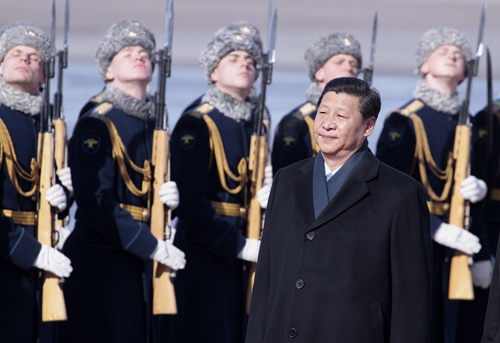

 |
| President Xi's last visit to Russia. (Photo/Xinhuanet) |
Chinese President Xi Jinping will attend the celebrations to commemorate the 70th anniversary of the defeat of the Nazisduring World War II in Moscow on May 9.
This year also marks the 70th anniversary of the victory of the Chinese People's War of Resistance Against Japanese Aggression (1937-1945).
As the main battlefield of WWIIin Asia, China’s sacrifices and war effortsto date have been largely overlooked from a traditional Europe-centric historical perspective, experts said.
Meanwhile, an increasing number of historians and scholars are noting the historical contributions of the Chinese and calling for a re-evaluation of China’s position and role in WWII.
China was the first country to fight the Axis invasion, and the Chinese People's War of Resistance Against Japanese Aggression is one of the greatest stories of WWII, which has not been fully acknowledged by the international community, Rana Mitter, a history professor and director of the Center for Chinese Studies at Oxford University, told the People’s Daily.
In his book “Forgotten Ally: China’s World War II, 1937-1945,” Mitter brings focus to the eight-year war against Japan, whichbegan two years before the Nazis invaded Poland– the widely-regarded starting point of World War II.
“The politics of the Cold War covered over that what is coming to be realized, I think, as one of the great missing pieces of the jigsaw puzzle of World War II,” Mitter said.
From 1931 to 1945, a total of 1.5 million Japanese soldiers were killed on Chinese soil, accounting for 70 percent of Japan’sWWII casualties. By the end of the war, 64 percent of the Japanese army was in China.
There were about 1.28 million Japanese soldiers in China when Japan surrendered, exceeding the total number of Japanese soldiers fighting in the Pacific and Southeast Asiantheaters.
China made tremendous sacrifices during their 14-year-long war. A total 35 million people, including soldiers and civilians, were killed and wounded. China’s economic losses reached $600 billion.
Yuri Tavrovsky, a famous Russian publicist and professor at the Peoples’ Friendship University of Russia, told the People’s Daily that China’s efforts saved the Soviet Union's Red Army fromsimultaneously fighting on two fronts.
Former US President Franklin D. Roosevelt once commented that, without China, or if China had been defeated, many more Japanese divisions would have been deployed to other areas and they would have been able to occupy Australia and India, and then push to the Middle East.
Former Soviet Union leader Joseph Stalin said, "Only when thehands and legs of the Japanese invaders were tied up could we avoid fighting on two fronts when the Germans invaded."
Tavrovsky said that, on the Eastern front, China long played a key role in fighting against the Japanese since they invaded Manchuria (now northeast China)in 1931.
Koketsu Atsushi, a famous historian and vice president of Yamaguchi University in Japan,told the People’s Daily that Japan deployed more troops to fight China than against the US. Japan fought China three times longer than it did the US.
Cheng Guoping, vice foreign minister of China, said at the 12th Blue Room Forum in Beijing on Tuesday that, China was a key member of the anti-fascist alliance and a main victor of World War II.
By fighting against the Japan’smain military forces, Cheng said China provided strong support to the Allied Forces in the European and Pacific battlefields, as well as worked to help form the anti-fascist united front. (Han Shuo, Chen Xiaowei, Huang Peizhao, Liu Junguo contributed to this story)
 J-11 fighters in air exercise
J-11 fighters in air exercise Beauties dancing on the rings
Beauties dancing on the rings Attendants-to-be join Mr. & Miss Campus Contest
Attendants-to-be join Mr. & Miss Campus Contest Beijing's toughest anti-smoking law takes effect
Beijing's toughest anti-smoking law takes effect Family lives in cave for about 50 years in SW China
Family lives in cave for about 50 years in SW China PLA soldiers operating vehicle-mounted guns in drill
PLA soldiers operating vehicle-mounted guns in drill Blind carpenter in E China's Jiangxi
Blind carpenter in E China's Jiangxi China hosts overseas disaster relief exercise for the first time
China hosts overseas disaster relief exercise for the first time 20 pairs of twins who will become flight attendants in Sichuan
20 pairs of twins who will become flight attendants in Sichuan Obama is sowing discontent in S.China Sea
Obama is sowing discontent in S.China Sea Rescuers work through night to reach cruise ship survivors
Rescuers work through night to reach cruise ship survivors Driving through limbo
Driving through limbo Facing down MERS
Facing down MERSDay|Week